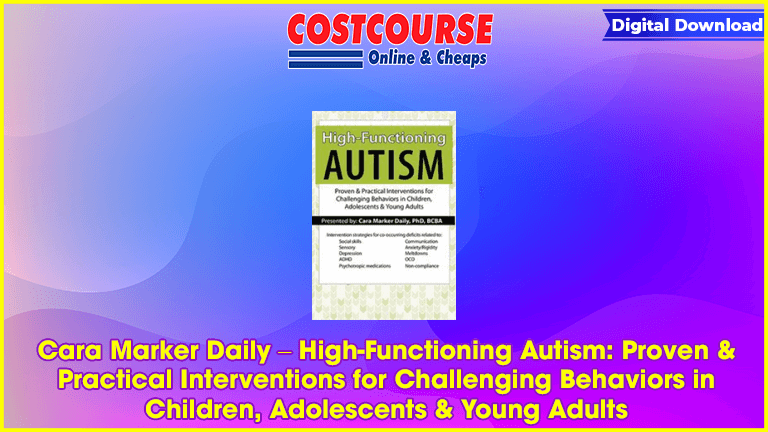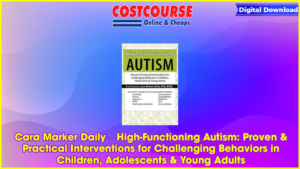Description
This intensive, full-day seminar recording provides proven intervention strategies, essential treatment tools, and behavioral techniques to help you analyze behaviors and actions, identify consequences for behaviors, and teach new skills to children, adolescents and young adults with high-functioning autism (HFA).
Cara Marker Daily – High-Functioning Autism: Proven & Practical Interventions for Challenging Behaviors in Children, Adolescents & Young Adults
Walk away with practical intervention techniques for social success, behavior changes and overcoming challenging co-occurring behaviors that deliver success through adulthood. The challenging co-occurring issues to be addressed are:
Social skills
Communication
Sensory
Anxiety/Rigidity
Depression
Meltdowns
ADHD
OCD
Psychotropic medications
Non-compliance
Gain valuable insight into common psychotropic medications, including both the helpful effects and potentially problematic side effects, that these individuals are prescribed. We will explore HFA and the new DSM-5® diagnosis of Social-Pragmatic Communication Disorder. You will receive the necessary tools to gain effective collaboration between clinicians, educators and parents. Through case studies, video clips and class participation you will complete the recording with confidence to identify actions that cause impediments in change, utilize more successful consequences for behaviors, and teach new skills to children, adolescents, and young adults with HFA. Don’t just manage these individuals; provide interventions that can lead to successful independence into their adult years!
Handouts
Manual – High-Functioning Autism (2.9 MB) 54 Pages Available after Purchase Illinois Educators Self-study Instructions (28.5 KB) Available after Purchase Illinois Educators Evaluation Form (1.2 MB) Available after Purchase Instructions for ASHA credit – Self Study (64.4 KB) Available after Purchase
Outline
DSM-5® and ICD-10 Updates
Social-Pragmatic Communication Disorder
Impact on service delivery (school/community)
Successfully link home, school and therapy
IEP/504/Do they qualify for school services?
Co-morbid disorders: Why the difference is important
Social Skills Interventions
Improve social skill deficits
“Kid Cop†behaviors and why other kids get angry
How to get peers to recognize them in positive ways
Group activities
Early intervention strategies that can deliver long-term success
Communication Interventions
Conflict resolutions that are effective in multiple settings
Help peers and family members relate
Verbal interventions that overload processing
Pragmatic language and other abstract issues
Sensory Interventions
Self-stimulation (appropriate & inappropriate)
Sensory strategies to avoid
Coping/calming techniques that reduce meltdowns
Sensory diet
Anxiety Interventions
Anxiety-reducing activities
How anxiety impacts rigidity
Help them “self-regulateâ€
Successful transitions
Depression Interventions
Impact on flexibility and change
Therapy that works for people with HFA
Emergence in adolescence
Solitude vs. loneliness
ADHD Interventions
ADHD vs. hyper-focus
Commonly prescribed medications and possible benefits and side effects
Specific triggers and what fuels the rage
Reduce aggressive and disruptive behaviors
Mistakes that escalate defiant behaviors
Overcome refusals to comply with even simple requests
Obsessive-Compulsive Disorder (OCD) Interventions
What to do when they become stuck on high interest areas
Specific medication interventions
Impact on socialization and behaviors
Interventions for Specific Difficult Behaviors
Reduce Internet and electronic addictions
Changes in technology, school systems and mental health delivery
Cognitive-Behavior Therapy (CBT) for mood and anxiety
Psychopharmacological Interventions
Differentiate among common medications
Medications that mimic difficult behaviors
Side effects and off label use
Case Studies, Demonstrations & Activities
Case studies that demonstrate specific interventions for aggressive and non-compliant behaviors
iPad® apps for social success, behavioral changes and speech and language
Staff training techniques to experience what an individual on the spectrum might
Research, Risks and Limitations
Faculty
Cara Marker Daily, PhD, BCBA
Licensed Pediatric Psychologist
Daily Behavioral Health
Cara Marker Daily, PhD, BCBA, is a licensed psychologist and a Board Certified Behavior Analyst with over 20 years of experience providing assessment and treatment for children, adolescents and young adults with autism in the home, school, hospital and community settings. She works directly with educators, speech/language pathologists, occupational therapists, BCBAs and other professionals. Dr. Daily is the president and training director of Daily Behavioral Health, a leading behavioral health provider in northeast Ohio specializing in assessment, consultation, and treatment of autism, anxiety and disruptive behavior disorders. She is the founder and executive director of the Building Behaviors Autism Center, which has received numerous grants to provide free and reduced cost applied behavioral analysis services to individuals with autism.
Dr. Daily has written several cognitive-behavioral and behavioral-based curriculums focusing on teaching daily living skills to children with autism and published a peer-reviewed journal article supporting evidence for success of these programs. She has presented nationally on topics of autism, disruptive behaviors disorders, anxiety and chronic health conditions in the pediatric population. Dr. Daily has been featured in radio, television, and other media platforms in northeast Ohio. She is the author of The Key to Autism: An Evidence-Based Workbook for Assessing and Treating Children & Adolescents (PESI, 2016).
Dr. Daily received her Ph.D. in School Psychology at the University of South Carolina, and completed an internship in Pediatric Psychology at the Children’s Hospital of Philadelphia and a postdoctoral fellowship in Pediatric Psychology at The Children’s Hospital at The Cleveland Clinic. Dr. Daily is a member of the Department of Pediatrics at Fairview Hospital at the Cleveland Clinic, the American Psychological Association, the Ohio Psychological Association, and the Christian Association of Psychological Studies.
Speaker Disclosures:
Financial: Cara Marker Daily is the president/training director for Daily Behavioral Health, Inc. She is the founder/executive director of the Building Behaviors Autism Center. She is a compensated consultant for Rethink Autism. She receives a speaking honorarium from PESI, Inc.
Nonfinancial: Cara Marker Daily has no relevant non-financial relationship to disclose.








